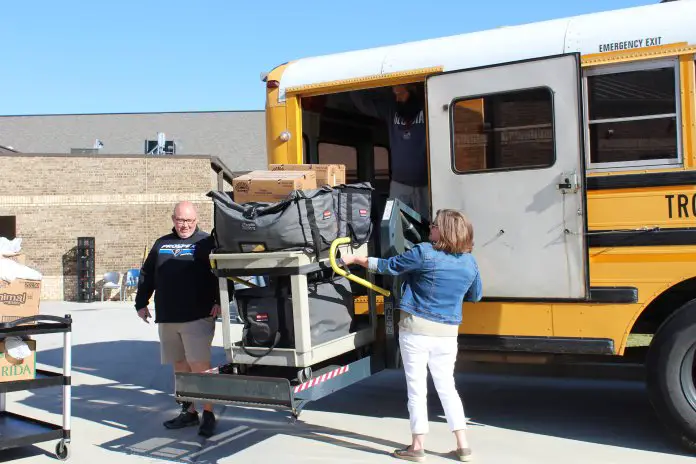For some children, school is the only place where they can reliably get something to eat.
And that’s been a challenge since Gov. Brian Kemp early this month ordered Georgia’s schools to close for the rest of the academic year to try to contain the spread of COVID-19.
Nearly 60% of Georgia’s public school students qualify for free- or reduced-price meals. With school cafeterias closed for the remainder of the school year, ensuring those children stay fed has become a major undertaking in local school districts.
Statewide, workers and volunteers handed out over 7 million meals in three weeks, according to Georgia School Nutrition Director Linette Dodson.
“We are very grateful for the hard work of our local district school nutrition staff and other local district staff members who are supporting our meal service,” Dodson said. “They are doing great work to fill important needs with our Georgia children.”
During a normal three week period, students would eat closer to 25 million meals, but serving students without a school building presents new logistical challenges that some families struggle to overcome. That holds especially true during spring break season.
In Troup County alone, staff and volunteers delivered over 51,000 breakfasts and lunches on April 3. That was the Friday before spring break and by far the busiest day since schools closed their doors to comply with the governor’s initial March 16 order to close schools.
“It was absolutely crazy,” said Troup County Schools nutrition director Diane Paine. “We had food stacked up everywhere. The non-perishables were stacked in the cafeteria because we ran out of a room in the storage rooms in the kitchen, and our walk-in coolers were top to bottom filled with different coolers and boxes of food.”
These days, school lunches contain fewer perishable items and more prepackaged foods, so parents can stow them in the cupboard or refrigerator to serve later. Typical lunches include peanut butter and jelly sandwiches, chicken nuggets, hamburgers, fresh fruit or carrot slices. For breakfast, schoolchildren might get cereal, Pop Tarts or microwaveable pancakes.
Before Troup’s spring break, a team of 55 cafeteria employees, bus drivers, custodial staff, teachers and administrators distributed five breakfasts and five lunches to each student who needed them.
The meals were first delivered at bus stops, but Troup County has since adopted a drive-through system to help prevent the spread of novel coronavirus. Federal regulations require meals to be distributed to anyone 18 or younger, regardless of whether they are a student, and to any person with special needs 21 and under, Paine said.
Volunteers ended up preparing 11,000 more meals than anticipated after demand far outstripped their expectations.
Paine said she’s never been more proud of her crews than on that Friday before spring break when they were running from school to school to make sure everyone had the food they needed.
“They’re my heroes,” she said. “They have been very selfless in their efforts. And they have done everything they needed to do and more. It seems like I’m asking them to do something new each day, and they never say no, never say I can’t do it. They’re just always there, and they come through.”
Across Georgia, whose state superintendent Richard Woods called “unsung heroes in our state” — lunchroom staff, bus drivers, janitors and others.
“Like all other heroes, you continue to go above and beyond to support students, dealing with intense stress and strain, through long hours – balanced with the demands of your own families and children, and often wearing the new, common uniform of masks and gloves,” Woods said in a statement.
Crystal Vickery is a mother of three in Griffin-Spalding Schools, and she is also caring for another young family member. The children are between two and six.
Vickery is out of work and doesn’t have transportation, and her boyfriend isn’t working either – he’s locked upstairs in self-quarantine with what they’re hoping is a sinus infection.
“Our 2-year-old is taking it the hardest,” she said. “She is such a daddy’s girl. She wants to be next to him always. She’s been having nightmares and acting up because she wants his attention.”
Vickery wanted to get meals, but she said none of the four schools in the district where meals are distributed are within walking distance for the little ones. Parents are not allowed to pick up meals without kids present.
“I would have walked, but all my kids can’t walk that far,” she said.
Vickery said she recently was approved for food stamps, and she is able to walk to a nearby Ingles to shop. That’s solved one problem, but life still isn’t easy.
“We are OK right now,” she said. “They don’t have the snacks like they would like, but as long as they have food, I’m OK with that. But we went over a month with nothing. Even a young lady that works at the DFCS office went and bought us food. Our family has gone through so much.”
Other parents said they have transportation, but the schools don’t have the food supply.
Fayette County mother of three Wendy Chaney said she’s been picking up lunches each week except for once when her son was too sick to go out.
“I am a schoolteacher for a church and haven’t been to work in four weeks, and it’s up in the air if we will get paid for the rest of the school year,” she said. “So I’m clinging to my last paycheck of $350 dollars, just in case of emergency.”
Chaney said when they pulled into the school parking lot April 3 to get meals for spring break, the volunteers reluctantly waved her on.
“The workers have been super sweet and on top of everything, and I could tell they were sad when they had to tell us they were all out of food,” she said.
The number of meals prepared for each site were calculated based on the average number of meals served over the prior three-week period, but more children showed up, which meant supplies ran out at some schools said Kokeeta Wilder, school nutrition program director for Fayette County Public Schools.
In a statement, Wilder apologized to families who were not able to pick up meals, but said she was proud of the workers who handed out over 16,000 meals in one day.
“Our staff worked harder than ever to prepare and distribute the extra meals. It is amazing what our staff was able to accomplish in a short period of time, and I want them to know how proud I am of the work they did to help ensure that our children have enough food to eat while the school system is on spring break,” she said.
Disclosure: This article may contain affiliate links, meaning we could earn a commission if you make a purchase through these links.






